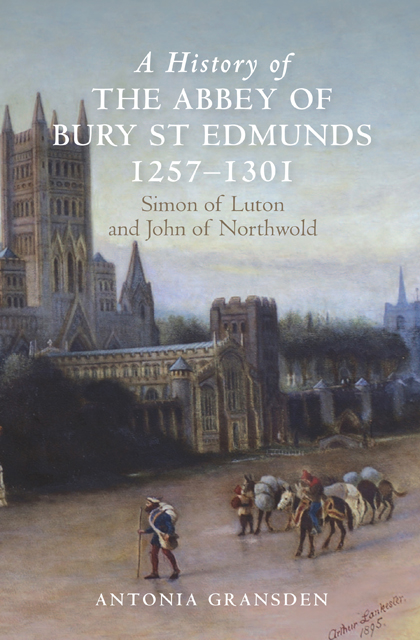Book contents
- Frontmatter
- Dedication
- Contents
- List of plates
- List of figures
- Preface
- Editorial note
- Dedication
- Acknowledgements
- Abbreviations
- Maps and plans (figures 1–11)
- Part I Introduction
- Part II Abbatial Governance
- Part III The Abbey’s Economy
- Part IV Religious Life and Reform
- Part V Intellectual and Cultural Life
- Appendix I The identity of the abbot’s justices, Henry of Guildford and Henry of Shenholt (in 1287)
- Appendix II The monks’ dietary regime: their food and drink
- Select List of the Registers and Customaries Cited
- Select List of Further Manuscripts Cited
- Select Bibliography
- Index
- Backmatter
19 - Abbatial Vacancies: Problems and Solutions
Published online by Cambridge University Press: 22 February 2023
- Frontmatter
- Dedication
- Contents
- List of plates
- List of figures
- Preface
- Editorial note
- Dedication
- Acknowledgements
- Abbreviations
- Maps and plans (figures 1–11)
- Part I Introduction
- Part II Abbatial Governance
- Part III The Abbey’s Economy
- Part IV Religious Life and Reform
- Part V Intellectual and Cultural Life
- Appendix I The identity of the abbot’s justices, Henry of Guildford and Henry of Shenholt (in 1287)
- Appendix II The monks’ dietary regime: their food and drink
- Select List of the Registers and Customaries Cited
- Select List of Further Manuscripts Cited
- Select Bibliography
- Index
- Backmatter
Summary
Of all the written records produced under Abbot John of Northwold, perhaps the most impressive is the survey of St Edmunds’ knights’ fees which he commissioned in 1300. In the course of its composition, its anonymous author undertook extensive and thorough research. He consulted Abbot Baldwin’s Feudal Book, Domesday Book, Abbot Samson’s survey, a now lost survey made by Abbot Simon of Luton and other documents in the abbey’s archives, as well as oral evidence. From the materials thus collected he composed a well-structured and extremely detailed work. He states his intentions and method in a businesslike preface:
At the order of my Lord, John of Northwold, by the grace of God abbot of St Edmunds, I have collected and endeavoured to assemble in one place, as far as I could, the fees and services of the military tenants of the honour of St Edmund, from the Conquest of England or from the time of the first enfeoffment of those fees, which were found written down in various books and scattered places. These are quite evident from inspection of those books and from the relation of trustworthy people, and also from my office, in which I have long served, and from the itinerant bailiffs and those serving in the office of the fees (‘officium feod’’).
The author next admits that he has only discovered the ‘extents or qualities (qualitates)’ of those fees which Abbot Simon or Abbot John had held in wardship, and of those described in Baldwin’s Feudal Book or in Domesday Book. He believes that his compilation will always be useful to anyone wishing to know the names of the present tenants and about their fees and services. He then describes the arrangement of his survey, which is as follows: the name of the military tenant; his fee, the number of subtenants and the location of their holdings; the service he owed; the fines raised in the king’s court for the fee; and the extent or ‘quality’ of the fee, specifically or generally as described in the Feudal Book or in Domesday. The preface ends with a list of the fines paid to Abbot Simon by fifteen of the tenants for their service for the first Welsh war (1276), and with the note: ‘Item, in the time of Abbot John many fined with him for service on account of the second Welsh war’ (1282).
- Type
- Chapter
- Information
- A History of the Abbey of Bury St Edmunds, 1257-1301Simon of Luton and John of Northwold, pp. 198 - 202Publisher: Boydell & BrewerPrint publication year: 2015



